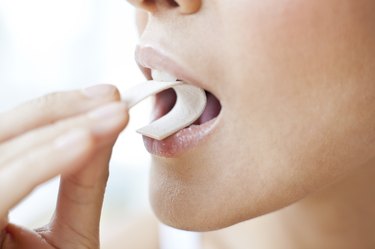
From sugar-free gum to hard candy, xylitol adds sweetness with few calories. Including xylitol sweetener in your diet has many health benefits, but when consumed in excess this food additive can cause digestive problems. Knowing your limits may help prevent xylitol diarrhea.
What Is Xylitol?
Video of the Day
Fruits like strawberries and vegetables like cauliflower have a natural sugar in them called xylitol. Your body also makes this substance as it breaks down dietary carbohydrates. Manufacturers create xylitol from grains like wheat and from hardwoods like birch. They constantly seek new processing methods to decrease their costs, according to a July 2019 review in Applied Microbiology and Biotechnology.
Video of the Day
You can find xylitol in sugar-free products like chewing gum and other low-carbohydrate candies. Gum is currently being investigated as a potential vehicle for drug delivery, according to a paper published in Trends in Food Science and Technology in September 2016. Chewing gums featuring xylitol have long-lasting flavor and are biodegradable and may make an ideal combination for medication delivery.
Xylitol also has a useful role as a food additive. The writers of a paper in the April 2014 issue of International Journal of Food Science and Technology tested xylitol-enhanced dough. Adding the natural sugar to wheat bread alters its texture and taste. Xylitol improves the texture of the bread, making it softer. It also makes it taste better.
Xylitol Health Benefits
A xylitol sweetener has 40 percent less calories than table sugar, according to a February 2019 report in ACS Biomaterials Science and Engineering. These researchers also noted that, compared to table sugar, xylitol doesn't dramatically raise your blood sugar level. They also considered xylitol inexpensive, abundant and safe.
Such benefits make xylitol ideal for people with diabetes. The low-calorie content of this sweetener will help keep your daily carbohydrates below the limit. This natural sugar can also protect your teeth. The authors of a paper published in Clinical Oral Investigations in April 2013 tested more than 200 children and found that chewing xylitol gum for six months caused a 10-percent decrease in cavities during the following two years.
The oral-health benefits of xylitol also suggest that it might have antibacterial effects. Yet the writers of a July 2014 article in the Journal of Laryngology and Otology argued against this notion. Instead, these researchers believe that xylitol enhances your immune system. Xylitol also has lubricant-like properties and prevents micro-organisms like the bacteria Streptococcus mutans from sticking to your teeth and causing decay.
Xylitol Side Effects
These benefits might come at a price. Xylitol has a dose-dependent laxative effect, according to a July 2016 review in the International Journal of Dentistry. The more xylitol you take in, the more likely you are to experience this unwanted effect.
The study authors did not find this reaction with other sugar alcohols, like erythritol. But it's important to keep in mind the study authors were employed by Cargill, an organization that manufactures erythritol.
The authors of a January 2019 report from the International Food Information Council suggested that you can take between 20 and 70 milligrams of xylitol each day without experiencing side effects. Yet your tolerance level might be different, so you will have to stay vigilant. For perspective, one piece of sugar-free gum and candy contains about 100 milligrams of xylitol, according to August University, Dental School of Georgia.
Your body doesn't fully process xylitol, and that might cause you to experience bloating and gas. These symptoms can also lead to problems for those who have irritable bowel syndrome. Doctors might recommend a Fermentable Oligosaccharides, Disaccharides, Monosaccharides, and Polyols or FODMAP diet for people with this condition. Chemists classify xylitol as polyol, so people on the FODMAP diet should carefully watch their xylitol intake or avoid it altogether.
Warning
It's important to keep xylitol away from dogs, according to a July 2019 warning from the U.S. Food and Drug Administration, because it can be deadly. If you suspect xylitol poisoning in your dog, immediately contact your veterinarian.
- Applied Microbiology and Biotechnology: "Biosynthetic Strategies to Produce Xylitol"
- Trends in Food Science and Technology: "Chewing Gum: Production, Quality Parameters and Opportunities for Delivering Bioactive Compounds"
- International Journal of Food Science and Technology: "Effect of Xylitol on Wheat Dough Properties and Bread Characteristics"
- ACS Biomaterials Science and Engineering: "A Highly Elastic and Autofluorescent Poly(xylitol-dodecanedioic Acid) for Tissue Engineering"
- Clinical Oral Investigations: "Six Months of High-Dose Xylitol in High-Risk Caries Subjects — A 2-Year Randomised, Clinical Trial"
- Journal of Laryngology and Otology: "Xylitol and Its Usage in ENT Practice"
- International Journal of Dentistry: "Erythritol Is More Effective Than Xylitol and Sorbitol in Managing Oral Health Endpoints"
- U.S. Food and Drug Administration: "Paws Off Xylitol; It's Dangerous for Dogs
- International Food Information Council: "What Is Xylitol?"
- RXList.com: Xylitol